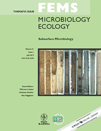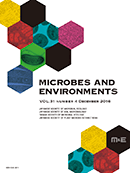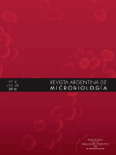
FEMS MICROBIOLOGY ECOLOGY
Scope & Guideline
Illuminating Microbial Interactions for a Healthier Planet
Introduction
Aims and Scopes
- Microbial Community Dynamics:
Research on the composition, structure, and interactions of microbial communities in various environments, including soil, aquatic systems, and host-associated microbiomes. - Ecological Impact of Microorganisms:
Study of how microorganisms influence ecosystem functions, nutrient cycling, and interactions with plants and animals, highlighting their roles in biogeochemical processes. - Microbial Responses to Environmental Changes:
Investigation of microbial adaptations and responses to environmental stressors such as pollution, climate change, and habitat alteration. - Microbial Biogeography:
Exploration of spatial patterns in microbial diversity and community assembly across different ecological gradients and geographical locations. - Applied Microbiology:
Research focused on the practical applications of microbiology in areas such as agriculture, bioremediation, and health, including the development of microbial solutions for environmental challenges.
Trending and Emerging
- Microbiome Interactions and Health:
There is a growing emphasis on understanding the interactions between microbiomes and their hosts, particularly in relation to human and animal health, emphasizing the importance of microbiota in disease prevention and treatment. - Microbial Resilience and Adaptation:
Research focusing on how microbial communities adapt and respond to environmental stressors, including climate change and pollution, is becoming increasingly prominent, highlighting the resilience of microbial life. - Synthetic Microbial Communities:
The study of engineered microbial communities and their applications in agriculture and environmental remediation is trending, reflecting interest in harnessing microbial interactions for practical benefits. - Multi-Omics Approaches:
Integration of genomic, transcriptomic, and metabolomic data to provide comprehensive insights into microbial functions and interactions is gaining traction, enabling more holistic understandings of microbial ecology. - Microbial Ecology in the Context of Climate Change:
Research examining the impacts of climate change on microbial communities and their roles in ecosystem processes is increasingly relevant, addressing urgent environmental challenges.
Declining or Waning
- Traditional Laboratory-Based Microbiology:
There has been a noticeable shift away from purely laboratory-based studies toward more field-based and ecological research, reflecting a broader interest in understanding microorganisms in natural environments. - Single-Species Studies:
Research focused on individual microbial species is declining in favor of studies that examine complex communities and interactions, aligning with a more holistic approach to microbial ecology. - Static Microbial Characterization:
The emphasis on static assessments of microbial diversity is waning, with a growing preference for dynamic studies that explore temporal changes and community interactions over time. - Focus on Pathogenic Microorganisms:
While still relevant, the focus on pathogenic microorganisms is declining compared to the increasing interest in beneficial and symbiotic microbial relationships in ecosystems.
Similar Journals

WORLD JOURNAL OF MICROBIOLOGY & BIOTECHNOLOGY
Connecting Theory and Practice in Life SciencesWORLD JOURNAL OF MICROBIOLOGY & BIOTECHNOLOGY, published by Springer, serves as a pivotal forum for advancing the fields of microbiology and biotechnology since its inception in 1990. Located in the Netherlands, this esteemed journal has secured a prominent position in the academic landscape, recognized for its strong impact factor and prestigious Q2 category rankings across disciplines such as Applied Microbiology, Biotechnology, and Physiological Sciences. Researchers and professionals utilize this journal to disseminate innovative findings and explore emerging technologies that are transforming the scientific landscape. With a robust submission rate and high visibility among the academic community, the journal fosters interdisciplinary collaboration, encouraging discussions that bridge gaps between theory and practical applications. As it converges into 2024, the WORLD JOURNAL OF MICROBIOLOGY & BIOTECHNOLOGY continues to be a vital resource for scholars aiming to enhance our understanding of microbial processes and biotechnological advances.

MICROBIAL ECOLOGY
Transforming ecological insights through microbial research.MICROBIAL ECOLOGY, published by Springer, is a premier journal dedicated to advancing the field of microbial ecology, illuminating the intricate relationships between microorganisms and their environments. Established in 1974, the journal reflects a strong historical commitment to disseminating high-quality research, with its current scope encompassing groundbreaking studies that explore microbial dynamics in various ecosystems. In the 2023 rankings, it has secured a prestigious position in Q1 across multiple categories, including Ecology, Evolution, Behavior and Systematics, and Soil Science, indicating its influential contribution to scientific literature. While it does not offer Open Access, the journal remains highly accessible to researchers and professionals via institutional subscriptions. With an impressive Scopus ranking across significant ecological categories, it serves as an essential resource for academics looking to deepen their understanding of microbial interactions and ecological processes, thereby facilitating innovative research and practical applications in environmental science.

Microbial Physiology
Exploring the Intricacies of Microbial LifeMicrobial Physiology is a premier, peer-reviewed journal published by KARGER, dedicated to advancing the field of microbiology through innovative research and reviews. With an ISSN of 2673-1665 and an E-ISSN of 2673-1673, the journal stands out in the academic landscape having established a strong track record since its inception in 2020, converging its scope until 2024. It proudly holds a Q2 category ranking in several key areas including Applied Microbiology and Biotechnology, Biochemistry, and Microbiology, making it an essential resource for researchers and professionals in these disciplines. The journal provides open access options to ensure that cutting-edge findings are widely disseminated, fostering collaboration and knowledge sharing. As a vital contributor to the ongoing discourse in microbial physiology, the journal serves as a platform for novel discoveries and methodologies that can significantly impact health, industry, and environmental sustainability. Located in Basel, Switzerland, it brings together a global community of scholars eager to further explore the complexities of microbial life.

AIMS Microbiology
Empowering researchers to shape the future of microbiology.AIMS Microbiology, published by the American Institute of Mathematical Sciences (AIMS), is an esteemed Open Access journal dedicated to advancing the field of microbiology since its inception in 2015. With an ISSN of 2471-1888, the journal aims to disseminate high-quality research and innovative findings pertaining to both fundamental and applied microbiology, encompassing areas such as medical microbiology, immunology, and related life sciences. Recognized for its academic rigor, AIMS Microbiology has achieved a significant standing, evidenced by its current Q2 ranking in both Microbiology and Medical Microbiology categories, along with impressive percentile rankings within prestigious Scopus metrics. Based in the United States, the journal not only emphasizes accessibility and widespread dissemination of knowledge but also plays a crucial role in fostering collaboration among researchers and professionals in the microbiological sciences. By providing a platform for collaborative research and innovative ideas, AIMS Microbiology is poised to influence the future development and application of microbiological research, making it a valuable resource for students, researchers, and practitioners alike.

MOLECULAR MICROBIOLOGY
Fostering Knowledge Exchange in Microbial ResearchMOLECULAR MICROBIOLOGY is a prestigious academic journal published by Wiley that has been at the forefront of research in the fields of microbiology and molecular biology since its inception in 1987. With an impressive Q1 rating in Microbiology and a Q2 rating in Molecular Biology for 2023, this journal serves as a vital platform for disseminating high-impact research that advances our understanding of microbial processes and interactions at the molecular level. The journal's ISSN is 0950-382X, and the E-ISSN is 1365-2958, making it easily accessible to a global audience of researchers, professionals, and students. Though not an Open Access journal, MOLECULAR MICROBIOLOGY remains committed to providing valuable insights and fostering knowledge exchange in the academic community. Situated in the United Kingdom and indexed in prominent databases like Scopus, the journal holds a strong standing, with current rankings reflecting its influential role in the academic landscape. Researchers in the field are invited to contribute and engage with cutting-edge discoveries that will shape the future of microbiological sciences.

MICROBES AND ENVIRONMENTS
Decoding the Microbial World for Enhanced Ecological UnderstandingMICROBES AND ENVIRONMENTS is a prominent academic journal dedicated to advancing the field of microbial ecology, published by the Japanese Society of Microbial Ecology. Since its inception in 1996, the journal has provided a vital platform for disseminating innovative research and insights into the intricate relationships between microbes and their environments. With an impressive impact factor reflected in its Q2 rankings across multiple categories, including Ecology, Evolution, Behavior and Systematics, Medicine, Plant Science, and Soil Science, MICROBES AND ENVIRONMENTS is acknowledged as a significant contributor within the ecological and biological sciences community. The journal’s content, which spans over two decades of cutting-edge research, supports researchers, professionals, and students in enhancing their understanding of microbial functions and their critical roles in various ecosystems. The journal does not operate under an open access model, ensuring that submissions undergo a rigorous peer-review process that upholds its reputation for quality. Engage with MICROBES AND ENVIRONMENTS to explore the ever-evolving landscape of microbial research and its implications for environmental sustainability and public health.

CANADIAN JOURNAL OF MICROBIOLOGY
Exploring the Frontiers of MicrobiologyThe Canadian Journal of Microbiology, published by Canadian Science Publishing, is a well-respected journal established in 1954 that serves as a vital platform for advancing knowledge in the fields of microbiology and related disciplines. With an ISSN of 0008-4166 and an E-ISSN of 1480-3275, this journal is recognized for its rigorous peer-review process and its commitment to disseminating high-quality research that spans applied microbiology, biotechnology, genetics, immunology, and more. Currently indexed in several prestigious databases, its impact factor and category quartiles highlight its significance, ranking in the top tiers of applied microbiology and biotechnology as well as other intersecting fields. The journal provides an essential resource for researchers, professionals, and students seeking to stay informed on the latest advancements and breakthroughs, facilitating collaboration and innovation in the microbiological sciences. Set in the dynamic landscape of academia from its headquarters in Ottawa, Canada, the Canadian Journal of Microbiology remains steadfast in its mission to promote research that addresses key challenges and opportunities within the microbiological community.

REVISTA ARGENTINA DE MICROBIOLOGIA
Empowering research and collaboration in microbiology.REVISTA ARGENTINA DE MICROBIOLOGIA, published by the ASOCIACION ARGENTINA MICROBIOLOGIA, stands as a prominent open-access journal in the field of microbiology and medicine since its establishment in 1979. With an ISSN of 0325-7541 and an E-ISSN of 1851-7617, this journal has paved the way for disseminating high-quality research while enhancing accessibility for academics and practitioners worldwide. The journal has achieved notable rankings, being classified in Q3 for Medicine (miscellaneous) and Q3 for Medical Microbiology in 2023, reflecting its commitment to advancing knowledge in these critical areas. Despite its relatively modest impact factors, it occupies a vital niche in the academic landscape, fostering collaborations and innovative research among experts. With Open Access available since 2013, REVISTA ARGENTINA DE MICROBIOLOGIA not only facilitates widespread distribution of valuable scientific information but also empowers researchers, professionals, and students to stay abreast of the latest findings and developments in microbiology. For those engaged in the evolving realm of microbiology, this journal serves as an essential resource for sharing insights and advancing the scientific community.

MICROBIOLOGY
Exploring Innovations in Applied MicrobiologyMICROBIOLOGY (ISSN: 0026-2617, E-ISSN: 1608-3237), published by MAIK NAUKA/INTERPERIODICA/SPRINGER, is a pivotal journal in the field of microbiological research, operating from the vibrant hub of New York, United States. With a focus on the intricate relationships and functionalities of microorganisms, MICROBIOLOGY serves as an essential resource for professionals and researchers dedicated to advancing the knowledge of applied microbiology and biotechnology. As of 2023, it holds a competitive Q3 and Q4 category ranking in Applied Microbiology and Biotechnology and Microbiology, respectively, reflecting its commitment to high-quality and impactful research. Although currently not open access, the journal extends comprehensive insights into critical topics that span environmental microbiology, clinical applications, and biotechnology advancements, making it a vital platform for disseminating innovative findings in this ever-evolving discipline. Researchers and students alike will find MICROBIOLOGY to be an invaluable addition to their academic and professional repertoire.

JOURNAL OF MICROBIOLOGY
Innovating biotechnology through microbiological research.JOURNAL OF MICROBIOLOGY, published by the Microbiological Society Korea, is a prestigious peer-reviewed journal dedicated to the advancement of knowledge in the fields of microbiology, applied microbiology, and biotechnology. Established in 1996, this journal serves as a vital platform for researchers and professionals from around the globe to disseminate their findings and engage in multidisciplinary discussions pertaining to microbial sciences. With an H-index that reflects its impact, the journal holds a commendable Q2 ranking in key categories including Applied Microbiology and Biotechnology, as well as Medicine (Miscellaneous), which underscores its significance in the academic community. Despite being a subscription-based journal, the JOURNAL OF MICROBIOLOGY aims to contribute to the understanding of microbial processes and their applications, facilitating advancements that are essential in health, industry, and environmental sciences. Researchers, students, and practitioners are encouraged to explore this rich resource for the latest research and trends in microbiology.